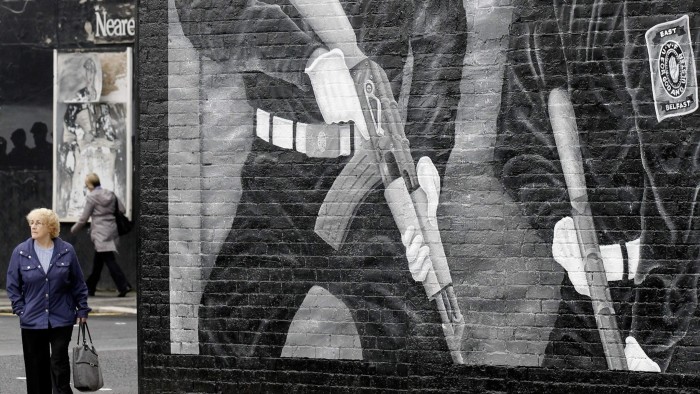Northern Ireland cannot afford a British EU exit

Roula Khalaf, Editor of the FT, selects her favourite stories in this weekly newsletter.
Britain’s EU referendum campaign is dominated by arguments over the economy and migration. But the outcome will also have significant consequences for the unity of the United Kingdom. Here, much of the political debate is focused on the implications for Scottish independence and the well-founded fear that a vote to leave could trigger a second referendum.
Too little attention is paid to the threat Brexit poses to stability in Northern Ireland. Nearly two decades after the signing of the Good Friday agreement, the Northern Ireland peace process stands as a remarkable, if fragile, political achievement.
In the decades before the 1998 pact, some 3,600 people were murdered in sectarian violence. Today, the province enjoys a calm and prosperity that would have once been unimaginable, an accomplishment for which two former British prime ministers, John Major and Tony Blair, deserve much credit. As both declared on a visit to the province on Thursday, Brexit would put the settlement at risk.
The UK’s departure from the EU would bring back a hard border between Northern Ireland and the Irish Republic, an EU member state. Since the Good Friday agreement, the old dividing line imposed at Irish partition in 1922 has virtually disappeared. The free movement of people and goods between north and south is a powerful symbol of how the communities of Ireland are now at ease with each other.
If Britain votes to leave, the 310-mile border will become the UK’s sole land frontier with the EU. Immigration controls would have to be reimposed to prevent EU nationals from entering the UK through a “back door” route.
The EU would have to apply customs controls on the UK, which would almost certainly have to leave the single market.
The Leave campaign downplays the consequences, insisting that a common travel area would remain safely in place. Given that one of the campaign’s main slogans is “take back control of our borders”, this reassurance cannot be taken seriously.
The return of a hard frontier between north and south could be a significant setback for the peace process. The fraught debate over Irish unity would rear its head again, giving voice to the hardliners among unionists and republicans.
The imposition of customs controls would inflict economic harm. The unhampered flow of goods between north and south, worth about €3bn a year, has benefited both sides. Undermining the trade would be especially damaging for Northern Ireland since the Republic is its biggest trading partner. It would also set back the economic convergence between north and south that has underpinned the peace.
The EU has been the vessel through which many of Europe’s nations have resolved their longstanding enmities. This applies particularly to Britain and Ireland. When Belfast was consumed by the “Troubles” in the 1970s, politicians in London and Dublin barely knew each other. Ireland was not in Nato or the Commonwealth.
The common forum for both states became Brussels, where the two countries have joined hands over many policy issues. It is a setting which has fostered a climate of trust and respect.
In Britain’s raucous referendum debate, the future of the province will make few headlines. But that should not detract from what is at stake. Northern Ireland is one of the few examples of a peaceful resolution to what seemed an intractable sectarian conflict. Reimposing a border on the island of Ireland is an immense price to pay for Britain to leave the EU.
Letter in response to this editorial:
Alternative hard border for Northern Ireland / From Paul Gosling
Comments